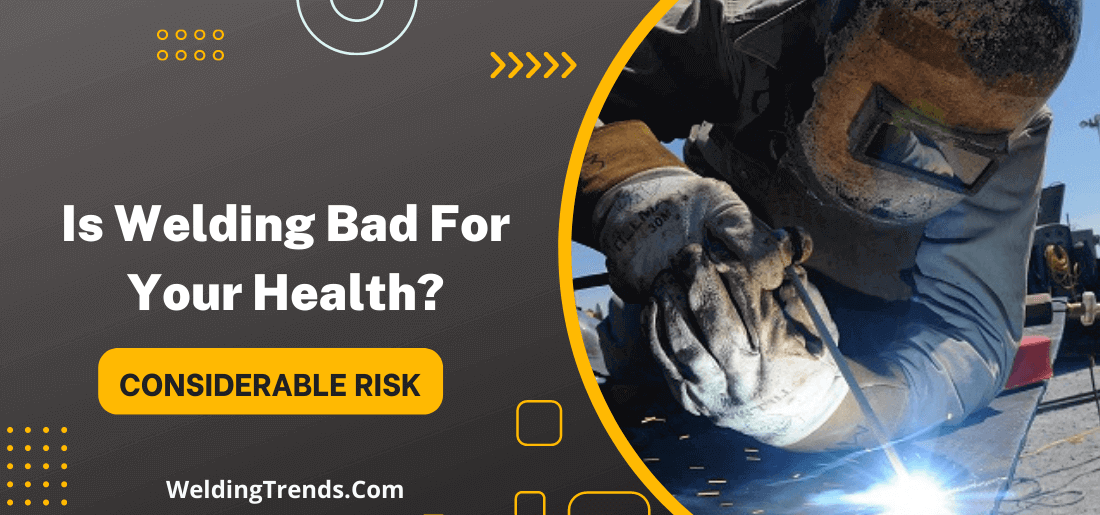Welding, although beneficial in terms of the final product it produces, may be hazardous to your health. The fumes and gasses released during the welding process can be dangerous if you are not adequately protected. It is important to take the necessary precautions to protect yourself when welding and to always use the appropriate safety equipment
In this blog post, we’ll discuss some of the health risks associated with welding and what you can do to protect yourself.
How does welding affect your health and safety?
Welding can produce hazardous fumes and ultraviolet radiation, which can lead to respiratory issues and eye damage. It is important to always use proper ventilation and protective equipment when welding to prevent these health risks.
In addition, electrical shock and burns are also potential hazards of welding, so following safety protocols is crucial in preventing accidents.
Another risk to be aware of is metal fumes, which can lead to metal fume fever and neurological problems if inhaled in large quantities. It is important to wear a respirator and work in a well-ventilated area to avoid this risk.
Also, proper training and understanding of the equipment being used can help to ensure a safe welding environment. Overall, taking necessary precautions and following proper safety procedures can greatly reduce the health and safety risks associated with welding.
What are the risks associated with welding fumes and gasses?
The following are the risks associated with welding fumes and gasses:
- Inhalation of fumes can lead to respiratory issues such as irritation of the throat and lungs, metal fume fever, and long-term effects such as occupational asthma or metal poisoning.
- Exposure to certain gasses, such as carbon dioxide and oxygen depletion, can result in dizziness, loss of consciousness, and even death.
- The fumes and gasses may also have harmful effects on the skin and eyes.
Welders need to take proper precautions, such as wearing a respirator and working in a well-ventilated area, to reduce their risk of exposure to these hazards.
What can you do to protect yourself while welding?
- Wear the appropriate personal protective equipment, including a respirator, welding helmet, gloves, and protective clothing.
- Make sure to work in a well-ventilated area or use ventilation systems to reduce exposure to fumes and gasses.
- Follow safety protocols and properly maintain equipment to prevent electrical shock and burns.
- Receive proper training and education on welding techniques and safety measures.
- Regularly monitor the air quality in the welding area to ensure it is safe for work.
- Take breaks as needed to avoid overexposure and fatigue.
Overall, taking necessary precautions and following safety procedures can greatly reduce the health and safety risks associated with welding.
Are there any long-term health effects of welding exposure?
According to the Centers for Disease Control and Prevention (CDC), long-term exposure to welding fumes can lead to serious health issues such as lung damage, metal fume fever, and various types of cancer.
Also inhaling certain welding fumes, such as manganese, can lead to neurological problems including difficulty with speaking and movement.
Welders need to take necessary precautions, such as using proper ventilation and wearing personal protective equipment, to reduce their risk of these harmful health effects. Employers also have a responsibility to provide a safe working environment for their welders.
Overall, it is important to be aware of the potential risks and take steps to protect oneself from the potential long-term health effects of welding exposure.
What should you do if you experience any adverse health effects from welding fumes or gasses?
If experiencing any immediate symptoms, such as difficulty breathing or dizziness, seek medical attention immediately. Inform your employer about the incident and any health effects you are experiencing.
Report the issue to the Occupational Safety and Health Administration (OSHA) to ensure proper investigation and prevention in the future. Consult with a doctor about any ongoing health concerns and steps to take for treatment and prevention.
It is important to prioritize your health and safety and take the necessary steps to address any adverse effects from welding fumes or gasses.
Along with this, it is important to take necessary precautions and follow safety procedures to prevent these health effects from occurring in the first place.
FAQs – welding health risks
Do welders have bad lungs?
There is potential for welders to have respiratory issues due to inhalation of fumes, but it largely depends on the specific circumstances and measures taken to prevent exposure.
Along with proper ventilation and using a respirator, regularly monitoring air quality can help reduce the risk of potential lung damage.
Is welding worse than smoking?
There is no clear answer to this question as it depends on the individual’s specific health and lifestyle factors. While both welding and smoking can have harmful effects on a person’s health, it is important to note that the risks associated with welding vary depending on the type of materials being welded and the precautions taken by the welder.
The health impacts of smoking can be greatly reduced or eliminated by quitting, while it is not possible to eliminate the risks of welding.
Ultimately, it is important for welders to take necessary safety precautions and for smokers to quit to minimize their health risks.
Do welders get Parkinson’s?
There is no clear link between welding and the development of Parkinson’s disease. While some studies have shown an increased risk for welders, particularly those who work with manganese-containing materials, other studies have not found a significant association.
Welders need to take necessary safety precautions and monitor their health, as with any job that may have potential health risks. However, many other factors can contribute to the development of Parkinson’s disease, such as genetics and exposure to pesticides or toxins.
Can welding cause anxiety?
While there is no direct evidence linking welding to anxiety, the high-pressure nature of the job and the potential for accidents can certainly contribute to feelings of stress and anxiety.
Welders need to practice proper safety measures and take steps to manage their mental health. Seeking support from coworkers, supervisors, and mental health professionals can also help alleviate anxiety in the workplace.
Can welding cause neurological problems?
The welder who particularly wok with manganese-containing materials can potentially contribute to neurological issues such as impaired cognitive function and symptoms similar to Parkinson’s disease.
However, many other factors can also affect a person’s neurological health, including genetics and exposure to other toxins.
Conclusion
So, is welding bad for your health? The answer to that question isn’t a simple one. It depends on the level of exposure and the individual worker.
While welding may not be the healthiest profession, it is still a viable option for many people. With the proper precautions, welders can enjoy long and healthy careers.
If you are interested in welding, make sure to take the necessary safety precautions and consult with your doctor if you have any concerns. Are you a welder? What safety measures do you take to protect your health? Let us know in the comments below.




